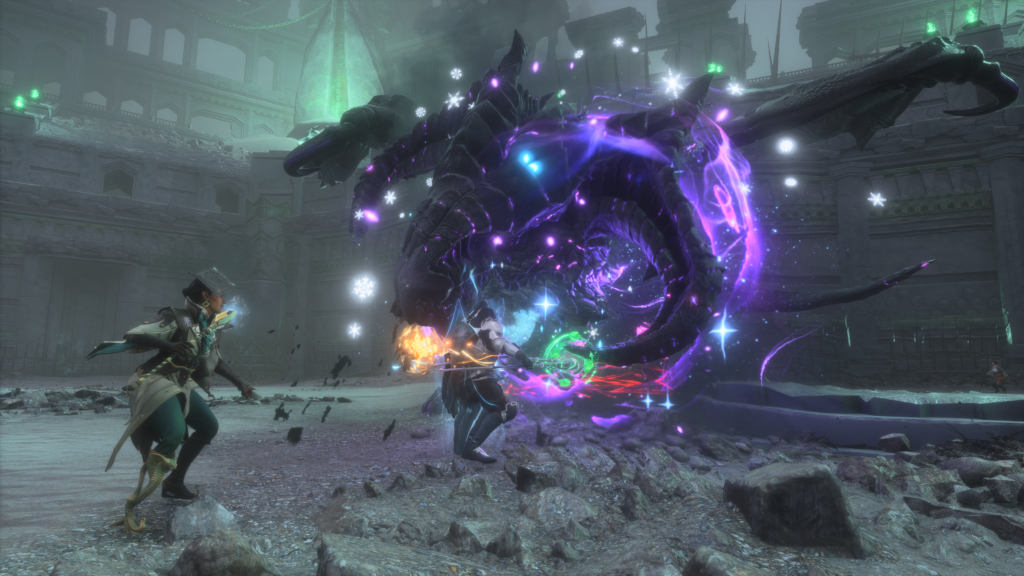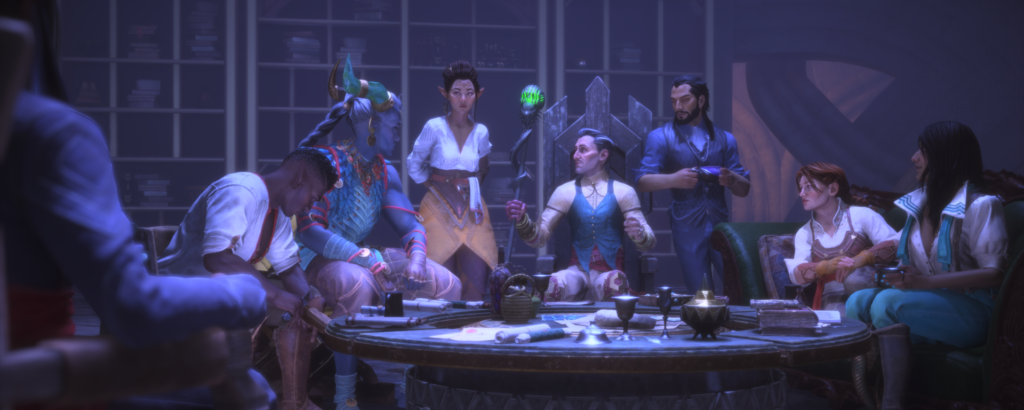I have a total of about 48 hours of played time in Veilguard at this point. My character is over level 40, and I’d guess I’m about two thirds to three quarters of the way through the main story. The game keeps drawing me in, providing events and stories that make me want to see what’s next even when sleep beckons.
There are a lot of factors in my enjoyment of Dragon Age: the Veilguard (Veilguard from here onwards), some of which I’m probably not conscious enough of to document. But I wanted to capture a few of the more ‘obvious’ things that have grabbed me thus far in the game.
Big set-piece moments
Veilguard is a very dynamic game, with highly mobile combat containing tons of ‘wow’ moments even in ordinary fights. But there are also big set-piece instances where the action takes on Wagnerian overtones. In these instances you battle huge monsters with gigantic area of effect attacks that knock down the local architecture, to say nothing of decimating your party.

One instance was so over-the-top that I was sure I must have accidentally entered the end game scenario. I’m trying to avoid spoilers here: but the battle involves a ‘god’ and their strongest allies. The story beats made i increasingly clear that my companions, my allies, and I were not ready for this fight- it was brutal.
It was also amazing to be part of. Despite ‘losing’ the fight, the events also made it clear that winning in the future should be possible. You bloody the foe despite losing: it was an encouraging yet harsh lesson told in the context of the story, and was very well done.
It turned out that, amazingly, this fight was really only at about the mid-way point in the story. Veilguard also has those situations where the game mechanics allow you to attempt things your party and your skills aren’t sufficient to beat:: in such instances you just die and reload from the last save point. But building this kind of ‘you have more to learn’ thing into the story so well isn’t that common.
Companions
Every one of the companions has grown on me. There were a couple that irritated me at the start- Bellara’s chirpy good mood and nattering in particular made her seem very shallow. But my relationship with them grew as their character narratives played out. Continuing with Bellara as my example, I was very nearly moved to tears by the end of her character arc.
There are lots of small moments interwoven into these character stories as well. Little things like a walk to feed the birds or a moment of ridiculous squawking- it isn’t all grand quests and violence. These are complex characters that grow to feel like people through their stories. So much so that I was left struggling a bit at one point to figure out who my Rook would establish a romantic relationship with.
Side characters
Becoming attached to the companions in Veilguard makes a lot of sense: the game designers invested a great deal of effort to make them feel well ‘fleshed out’. But I have also found that the story, both what I ‘do’ and what I read, have made several side characters into someone I care about.
There are a couple of obvious ones like Morrigan, who I’ve had a ‘relationship’ with now that spans several games and decades. Varric is another of course: he isn’t part of the action in much of the game, but his narrative voice is still very distinctive. But there are also a number of such characters that would in other games be mere set dressing, faceless quest givers that come and go without much notice.
There was one fellow that gave me several quests in Treviso who eventually becomes a hero in his own right, partially ‘off screen’ and partially through battles I played through. There death to the Blight could have been a simple single note in the background, but instead I experienced their heroism first hand.
And there are others whose main growth comes through the various letters and other documents that you collect more or less continuously while playing. I talk about this more under the ‘Lots of Lore’ heading, but for side characters these letters and notes often provide a great deal of depth to the small background players in the story.
Skills and power growth
I am playing Veilguard on the second-from-the-easiest “Keeper” difficulty. This means that, amongst other things, I don’t need to carefully min-max my character or party builds in order to be successful. But I still have felt a remarkable amount of logical and enjoyable power growth amongst the skill tree choices I’ve made.
I started the game with my mage character feeling quite fragile and rather weak. But the progression of my characters skills and power has been very satisfying. After completing well over half of the game I now feel like my mage is an impressive power house. Weaker foes are brushed away in displays of vast power, which is very satisfying.
Stronger foes, even playing at my choice of easy settings, require some careful use of combos with my team mates. I have found the whole combo system to be satisfying and simple enough to activate that I don’t feel a need to study or precisely practice each move.
All I need to do to use combos effectively is activate combat pause frequently and look for the nicely marked out combination power options and trigger them in sequence. Each of these combos feels suitably awesome in practice with bombastic explosions and weaker opponents near the target being tossed around the battlefield. I look forward to each opportunity to trigger these explosive powers.
I’m pretty sure that the combat experience is different for people playing on higher difficulty settings. Trying to get the perfect combination of powers and combos is likely a much bigger challenge when the monsters are stronger and combo timings are less forgiving. But one of the great things about Veilguard is that difficulty is very customizable, allowing folks who want a greater challenge to make things harder as they see fit.
Lots of lore to consume
Nearly every room you walk into in Veilguard has a few letters or documents lying around to read, many of which find their way into the games ‘Library’ menu. These are often wonderfully written thoughts and snippets of background and provide a great ‘snack’ of lore to enjoy between battles.
I found reading these small snippets of lore during and at the end of each play session was as rich an experience as many books I’ve read. My favourite amongst these with its own special quest series is a collection of ‘manifested’ repressed memories of the ‘god’ Solas. Completing this quest line was worth every minute for me as it uncovers a massive tranche of Thedas’ ancient history that spans all of the Dragon Age games to date, and it does a tremendous job explaining things I’ve often been perplexed by.
I would strongly recommend that anyone who enjoys reading at all should take the time to open Veilguard’s “Library” menu frequently and read the various letters and documents there.
One (1) bug
I have encountered exactly one noticeable bug in Veilguard during my 40+ hours of play time thus far. During a boss battle with a dragon named ‘Seartooth Vyrantus’, the bastard turned completely invisible!
This was not an actual power of the dragon, and it made defeating it more than a bit challenging. Thankfully this dragon was the only foe nearby and target lock kept my spells firing true. I defeated Seartooth, but it was definitely a close thing.
Note to Bioware: making me fight invisible dragons is not fair.

(Almost) Conclusion
I’m still not finished with Veilguard, although I feel that the end is in sight. After over forty hours of play, though, I have more than gotten my money’s worth out of the game. At this point I have no hesitation recommending the game to anyone who enjoys lore-rich action-oriented RPGs, and in particular for anyone who has enjoyed Dragon Age games in the past. I’d still call it a five out of five star game in the 90%+ range of satisfaction for me: obviously, your mileage may vary.
Dragon Age is and always has been different from more ‘crunchy’ rules-based reactive games like Baldur’s Gate and the Larian “Divinity” series. Even so, my personal ranking would put my level of enjoyment of this difference as comparable to the pleasure I got from Larian’s Baldur’s Gate 3.
